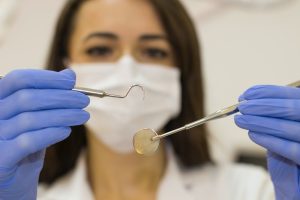FAQs
What is an ultrasonic tooth cleaner?
An ultrasonic dental cleaner is an electric or battery-powered device that cleans plaque and tartar from teeth. It looks a bit like the dental tool that dentists use to scrape plaque from teeth. But an ultrasonic cleaner doesn't require a scraping action like traditional dental tools.
Instead, it uses electromagnetic force that causes the tip to vibrate. The resulting ultrasonic vibrations then break apart and remove the plaque and calculus that has built up on your teeth.

What's more, a small stream of water comes out of the tip and helps blast away additional buildup while washing away the debris.
Ultrasonic technology has been shown to be successful in removing plaque and reducing gum infection, but the study pool is limited.
At the dentist
Dentists are now employing this ultrasonic technology in their practices because it's much faster than traditional dental scaling — in fact, it takes just 1/3 of the time. It's also much more comfortable for patients, because while scaling at the dentist doesn't necessarily hurt, the pressure and force used by the dentist can be uncomfortable.
Additionally, the flow of the water stream and the vibration frequency can be adjusted to relieve any remaining discomfort or sensitivity felt by the patient. Dentists may also have special tips that are designed to clean porcelain crowns and titanium implants.
At home
There are also ultrasonic dental cleaners available for home use. There's a bit of a controversy around whether or not it's safe for patients to use one on their own. The main objection is that removing tartar from teeth requires special training that only dental hygienists have.
But there are others who say that a quality ultrasonic cleaner when used properly, can help you keep up your oral hygiene and health in between dental visits.
To use an ultrasonic cleaner at home, follow the instructions that come with the device. In general, they will more or less include the following steps:
- Fill the reservoir with water (some models don't use water)
- Turn the cleaner on
- Gently and slowly move the tip along your gumline
- Stay bent over the sink to avoid making a mess
Can ultrasonic cleaning damage teeth?
Ultrasonic cleaning can damage teeth if the device isn't used correctly. If you get ultrasonic cleaning done at the dentist, you have nothing to worry about, but take care if using a cleaner at home.
Do dentists recommend ultrasonic cleaners?
Dentists typically only recommend ultrasonic cleaners for use in-office with a trained dental hygenist. It's possible that your dentist may recommend that you use one at home, in between cleanings.
Ask your dentist before you buy an ultrasonic cleaner — they may instead recommend that you increase your visits for professional cleaning. Or they may give you tips for better oral hygiene at home.
Does ultrasonic teeth cleaning hurt?
This method for cleaning teeth is supposed to be more gentle than traditional manual scrapers. Patients should feel little to no discomfort, and the time it takes to clean teeth is greatly reduced.
How does ultrasonic dental cleaning work?
Ultrasonic tooth cleaners use gentle vibrating technology to break down plaque and tartar buildup on teeth. They typically work with a small stream of water that removes additional plaque and debris.
